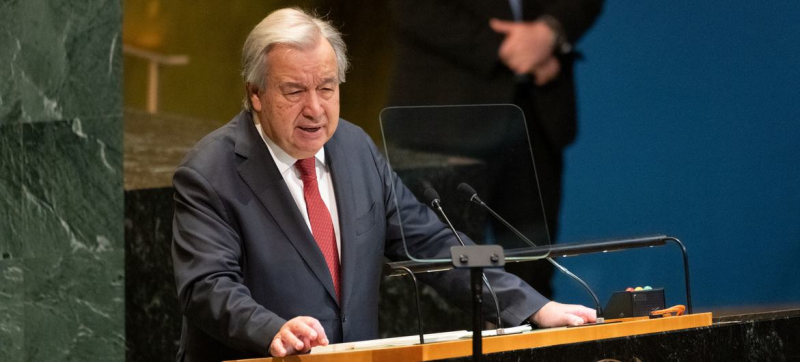- Iran vows to hit all ME economic hubs if US-Israeli attacks persist |
- Sammilito Islami Bank merger to continue: Governor |
- Biman Suspends Flights to Six Middle East Cities Over Tensions |
- Govt Announces 25pc Rail Fare Discount |
- Middle East War Puts Bangladesh Jobs at Risk |
Guterres unveils bold UN reforms for greater global impact

Secretary-General António Guterres briefs the UN General Assembly on the UN80 Initiative.
The UN Secretary-General on Wednesday outlined a series of proposals aimed at strengthening the organisation’s effectiveness and enhancing coordination across its three core pillars: peace and security, sustainable development, and human rights.
Addressing the General Assembly, António Guterres briefed Member States on the structural reforms and programme realignments needed across the UN system to make it fully fit for today’s global challenges.
“My vision for the United Nations system is clear: entities that work together as one, to deliver better – overcoming fragmentation, eliminating duplication, improving funding models, and maximising synergies,” the Secretary-General said.
‘For the people we serve’
He stressed the need for a more streamlined, collaborative, and cost-effective approach, “ensuring that resources entrusted to us deliver maximum impact for the people we serve.”
As part of the reform drive, Mr Guterres announced the creation of a dedicated UN80 implementation team to advance reform proposals, either by bringing them to intergovernmental decision-making bodies or moving forward unilaterally where it falls within his authority.
“The ultimate direction of the UN80 Initiative rests with you, the Member States of the United Nations,” Mr Guterres emphasised.
The briefing forms part of the UN80 Initiative, which aims to streamline operations, sharpen impact, and reaffirm the UN’s relevance in a rapidly changing world. This is the third of three workstreams created to guide the reform process.
Three workstreams for reform
Workstream 1 focuses on modernising business operations and improving efficiency across the Secretariat and the UN system – including through consolidated administrative platforms, relocations to lower-cost duty stations, and reduced real estate costs – while safeguarding core programme delivery.
Initial proposals included in the revised estimates for the 2026 budget are now before the General Assembly’s Fifth Committee, with decisions expected by December 2025.
Workstream 2 examines the full lifecycle of mandates to strengthen coherence, accountability, and impact.
Its initial recommendations are under consideration by an Informal Ad Hoc Working Group of the General Assembly, co-chaired by Jamaica and New Zealand, which is leading a “discovery phase” through the end of 2025.
Shifting paradigms
Among the 70-plus proposals included in the first progress report for Workstream 3 is a plan to consolidate and reconfigure peace and security teams at Headquarters in New York, as well as special political missions in Yemen, Cyprus, and Central Africa.
Other potential reforms include a merger between the UN Development Programme (UNDP) and the United Nations Office for Project Services (UNOPS) — a move Mr Guterres said would “create a stronger engine for sustainable development, with greater reach and scale.”
He also mentioned the possible merger of UN Women and the United Nations Population Fund (UNFPA) to form “a unified and more powerful voice on gender equality and the rights of women and girls.”
‘More than a cost-cutting exercise’
Ahead of the Secretary-General’s briefing, Member States heard from Annalena Baerbock, President of the General Assembly, who echoed the call for Member States to engage constructively with the reform proposals set forth in Mr Guterres’s report.
Calling the initiative “more than a cost-cutting exercise,” she described the UN80 Initiative as being “about efficiency, agility, and the ability to leverage state-of-the-art technologies.”
Ms Baerbock also emphasised that while Member States cannot ignore the organisation’s “precarious fiscal situation,” they have a responsibility to uphold the UN’s founding principles.
“We cannot sacrifice the principles of this institution in the name of the ‘bottom line’,” she said.

